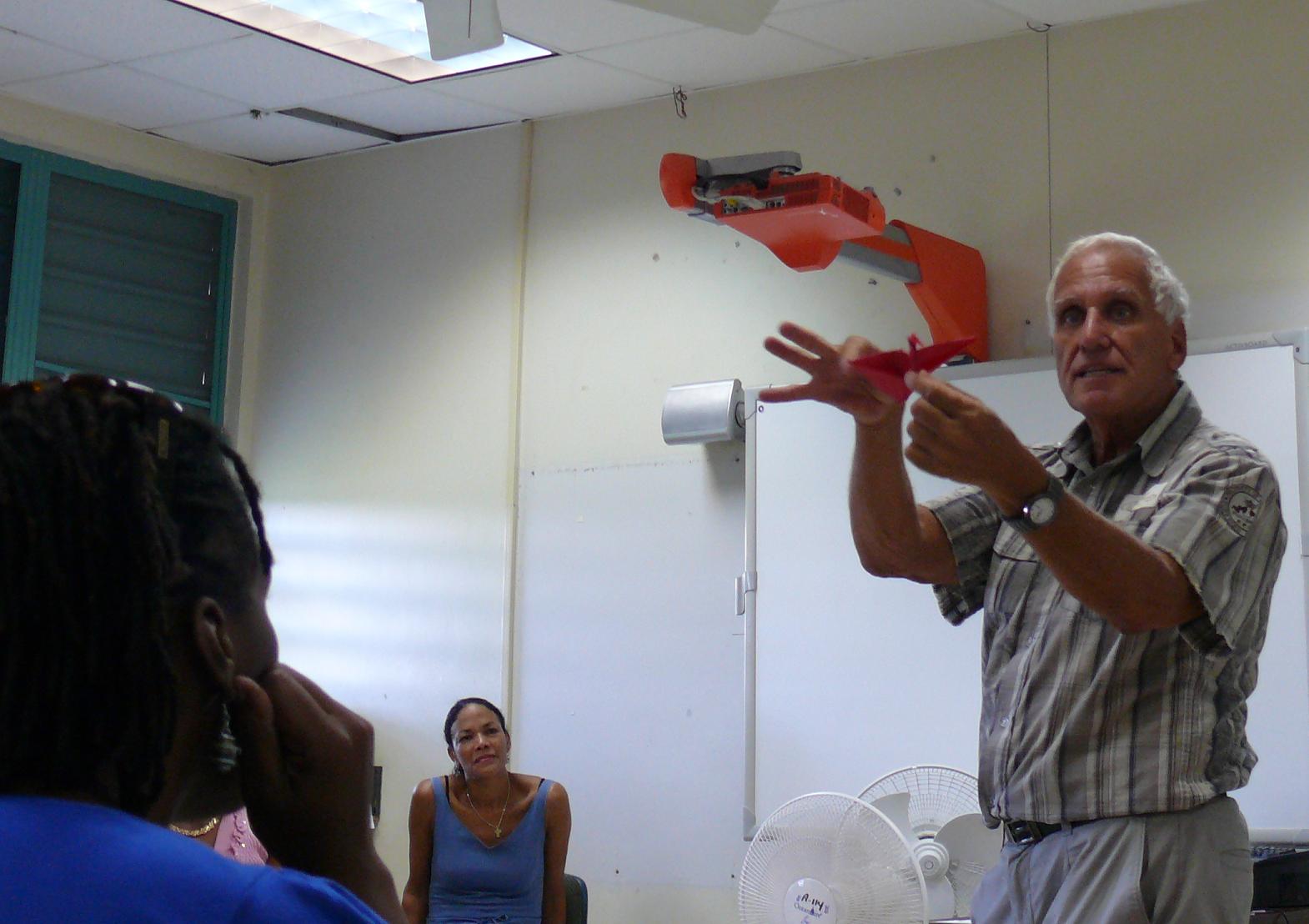
The annual union-sponsored teacher development day is a negotiated part of the teachers’ and school professionals’ contract, said Rosa Soto-Thomas, first vice president of the union’s executive board.
“We want to share cutting-edge research with our teachers, and it is important for them to receive the latest information pertaining to their subject,” said Soto-Thomas in an interview during the conference. “The union is not just about salaries and hours. It is about achieving the best academic outcomes for our students.”
Hundreds of teachers packed the school’s auditorium, listening to the dignitaries speak before splitting off into informational work sessions.
UVI President David Hall gave the keynote address, speaking about his concept of the “quest for greatness” and the role of UVI as a partner in the community, working together with the public school system and private employers to help prepare students for college and the workplace.
UVI played an unusually large role at the conference this year, said Soto-Thomas.
“They have always had an important presence, but this year it was a lot more,” she said. “In the weeks leading up to the conference, UVI professors were flooding our office with calls offering to help out.”
Gov. John deJongh Jr. addressed the gathering briefly, too.
“We believe that you are heroes for all that you do every day,” said deJongh. “And as we look forward to a future of increased information technology advancements, including additional broadband capabilities across the territory, our investments today will decidedly help propel our students’ potential and their ability to do great things in future years.”
He went on to stump a bit for the administration, touting the fact that no teachers or school staff have been laid off, despite a nationwide fiscal crisis forcing harsh cutbacks in many districts.
Newly elected St. Croix AFT President James Howell said in an interview during the conference that improving student performance was the union’s top priority.
“Our focus has always been greater academic outcomes for our students,” he said. Asked whether student performance might be impeded by the number of teachers who are not certified, Howell said the union agreed certification was crucial and had agreed to put into their labor contract that teachers can have their pay withheld if they are not certified. At the same time, the proportion of certified teachers has been increasing and is now over 80 percent, he said.
After the ceremonies and speeches, teachers split into workshops throughout Education Complex. Sessions ran the gamut from basic origami to how to use district, school and student test data to help drive the curriculum.
Alexandria Baltimore-Hoofkin and Yvette McMahon-Arnold, the state directors of assessment and instructional development, respectively, led one classroom full of teachers in a discussion of how to use standardized testing data gathered for federal Annual Yearly Progress measurements of school performance. There is data at the territorial, district, school, class and student level, said Baltimore-Hoofkin, showing Power Point examples of the types of data available. Once the areas that need attention are identified at whatever level, more of that sort of information and vocabulary can be brought into the everyday curriculum, regardless of the subject being taught.
“We are suggesting a total school approach,” said Baltimore-Hoofkin. “The burden does not lie with the math and science teachers alone.”
Language and vocabulary enrichment can be incorporated into all subjects, she said, offering the example of “Liz,” a hypothetical student having some trouble with reading comprehension. Incorporating more science vocabulary exercises into “Liz’s” daily readings and assignments in other classes will help give her the tools to more readily understand the science class readings and subject matter, Baltimore-Hoofkin suggested.
In another room, retired St. Croix teacher Cy Levine demonstrated several simple origami projects, guiding teachers in folding paper to make a box and lid, a crane and a crown.
“You can use this as a math lesson, to teach fractions and to develop visual skill and hand-eye coordination,” Levine said. “But today, my job is to evoke creativity.”
After a pause for lunch, the workshops continued long into the afternoon, in three consecutive hour-and-a-half sessions.
Teachers Become Students at St. Croix Mini-QuEST
Keeping our community informed is our top priority.
If you have a news tip to share, please call or text us at 340-228-8784.
If you have a news tip to share, please call or text us at 340-228-8784.
Support local + independent journalism in the U.S. Virgin Islands
Unlike many news organizations, we haven't put up a paywall – we want to keep our journalism as accessible as we can. Our independent journalism costs time, money and hard work to keep you informed, but we do it because we believe that it matters. We know that informed communities are empowered ones. If you appreciate our reporting and want to help make our future more secure, please consider donating.





